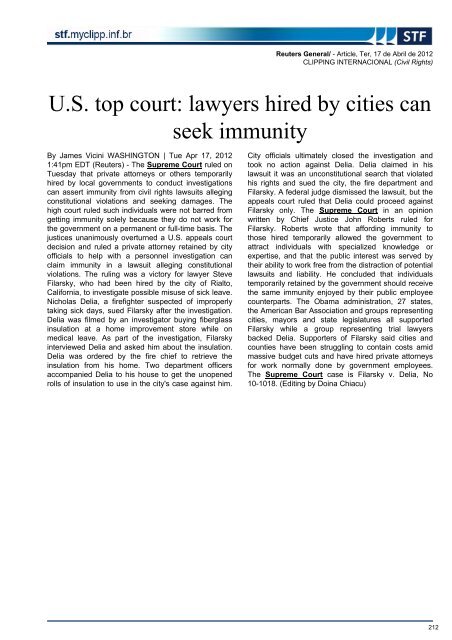STF na MÃdia - MyClipp
STF na MÃdia - MyClipp
STF na MÃdia - MyClipp
You also want an ePaper? Increase the reach of your titles
YUMPU automatically turns print PDFs into web optimized ePapers that Google loves.
Reuters General/ - Article, Ter, 17 de Abril de 2012<br />
CLIPPING INTERNACIONAL (Civil Rights)<br />
U.S. top court: lawyers hired by cities can<br />
seek immunity<br />
By James Vicini WASHINGTON | Tue Apr 17, 2012<br />
1:41pm EDT (Reuters) - The Supreme Court ruled on<br />
Tuesday that private attorneys or others temporarily<br />
hired by local governments to conduct investigations<br />
can assert immunity from civil rights lawsuits alleging<br />
constitutio<strong>na</strong>l violations and seeking damages. The<br />
high court ruled such individuals were not barred from<br />
getting immunity solely because they do not work for<br />
the government on a permanent or full-time basis. The<br />
justices u<strong>na</strong>nimously overturned a U.S. appeals court<br />
decision and ruled a private attorney retained by city<br />
officials to help with a personnel investigation can<br />
claim immunity in a lawsuit alleging constitutio<strong>na</strong>l<br />
violations. The ruling was a victory for lawyer Steve<br />
Filarsky, who had been hired by the city of Rialto,<br />
California, to investigate possible misuse of sick leave.<br />
Nicholas Delia, a firefighter suspected of improperly<br />
taking sick days, sued Filarsky after the investigation.<br />
Delia was filmed by an investigator buying fiberglass<br />
insulation at a home improvement store while on<br />
medical leave. As part of the investigation, Filarsky<br />
interviewed Delia and asked him about the insulation.<br />
Delia was ordered by the fire chief to retrieve the<br />
insulation from his home. Two department officers<br />
accompanied Delia to his house to get the unopened<br />
rolls of insulation to use in the city's case against him.<br />
City officials ultimately closed the investigation and<br />
took no action against Delia. Delia claimed in his<br />
lawsuit it was an unconstitutio<strong>na</strong>l search that violated<br />
his rights and sued the city, the fire department and<br />
Filarsky. A federal judge dismissed the lawsuit, but the<br />
appeals court ruled that Delia could proceed against<br />
Filarsky only. The Supreme Court in an opinion<br />
written by Chief Justice John Roberts ruled for<br />
Filarsky. Roberts wrote that affording immunity to<br />
those hired temporarily allowed the government to<br />
attract individuals with specialized knowledge or<br />
expertise, and that the public interest was served by<br />
their ability to work free from the distraction of potential<br />
lawsuits and liability. He concluded that individuals<br />
temporarily retained by the government should receive<br />
the same immunity enjoyed by their public employee<br />
counterparts. The Obama administration, 27 states,<br />
the American Bar Association and groups representing<br />
cities, mayors and state legislatures all supported<br />
Filarsky while a group representing trial lawyers<br />
backed Delia. Supporters of Filarsky said cities and<br />
counties have been struggling to contain costs amid<br />
massive budget cuts and have hired private attorneys<br />
for work normally done by government employees.<br />
The Supreme Court case is Filarsky v. Delia, No<br />
10-1018. (Editing by Doi<strong>na</strong> Chiacu)<br />
212











